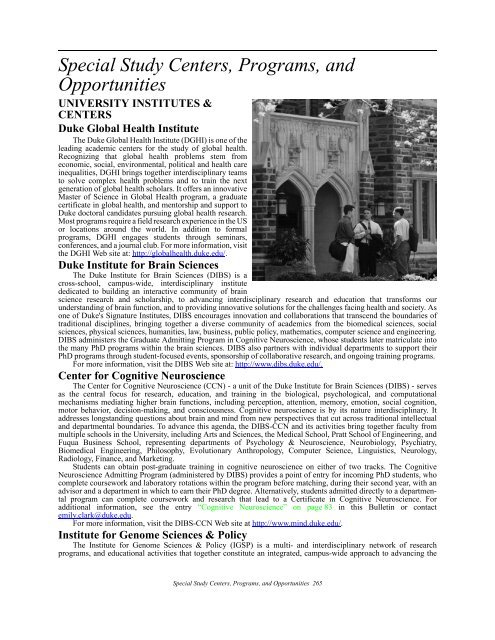Academic Calendar 2012-2013 - Office of the Registrar - Duke ...
Academic Calendar 2012-2013 - Office of the Registrar - Duke ...
Academic Calendar 2012-2013 - Office of the Registrar - Duke ...
Create successful ePaper yourself
Turn your PDF publications into a flip-book with our unique Google optimized e-Paper software.
Special Study Centers, Programs, and<br />
Opportunities<br />
UNIVERSITY INSTITUTES &<br />
CENTERS<br />
<strong>Duke</strong> Global Health Institute<br />
The <strong>Duke</strong> Global Health Institute (DGHI) is one <strong>of</strong> <strong>the</strong><br />
leading academic centers for <strong>the</strong> study <strong>of</strong> global health.<br />
Recognizing that global health problems stem from<br />
economic, social, environmental, political and health care<br />
inequalities, DGHI brings toge<strong>the</strong>r interdisciplinary teams<br />
to solve complex health problems and to train <strong>the</strong> next<br />
generation <strong>of</strong> global health scholars. It <strong>of</strong>fers an innovative<br />
Master <strong>of</strong> Science in Global Health program, a graduate<br />
certificate in global health, and mentorship and support to<br />
<strong>Duke</strong> doctoral candidates pursuing global health research.<br />
Most programs require a field research experience in <strong>the</strong> US<br />
or locations around <strong>the</strong> world. In addition to formal<br />
programs, DGHI engages students through seminars,<br />
conferences, and a journal club. For more information, visit<br />
<strong>the</strong> DGHI Web site at: http://globalhealth.duke.edu/.<br />
<strong>Duke</strong> Institute for Brain Sciences<br />
The <strong>Duke</strong> Institute for Brain Sciences (DIBS) is a<br />
cross-school, campus-wide, interdisciplinary institute<br />
dedicated to building an interactive community <strong>of</strong> brain<br />
science research and scholarship, to advancing interdisciplinary research and education that transforms our<br />
understanding <strong>of</strong> brain function, and to providing innovative solutions for <strong>the</strong> challenges facing health and society. As<br />
one <strong>of</strong> <strong>Duke</strong>'s Signature Institutes, DIBS encourages innovation and collaborations that transcend <strong>the</strong> boundaries <strong>of</strong><br />
traditional disciplines, bringing toge<strong>the</strong>r a diverse community <strong>of</strong> academics from <strong>the</strong> biomedical sciences, social<br />
sciences, physical sciences, humanities, law, business, public policy, ma<strong>the</strong>matics, computer science and engineering.<br />
DIBS administers <strong>the</strong> Graduate Admitting Program in Cognitive Neuroscience, whose students later matriculate into<br />
<strong>the</strong> many PhD programs within <strong>the</strong> brain sciences. DIBS also partners with individual departments to support <strong>the</strong>ir<br />
PhD programs through student-focused events, sponsorship <strong>of</strong> collaborative research, and ongoing training programs.<br />
For more information, visit <strong>the</strong> DIBS Web site at: http://www.dibs.duke.edu/.<br />
Center for Cognitive Neuroscience<br />
The Center for Cognitive Neuroscience (CCN) - a unit <strong>of</strong> <strong>the</strong> <strong>Duke</strong> Institute for Brain Sciences (DIBS) - serves<br />
as <strong>the</strong> central focus for research, education, and training in <strong>the</strong> biological, psychological, and computational<br />
mechanisms mediating higher brain functions, including perception, attention, memory, emotion, social cognition,<br />
motor behavior, decision-making, and consciousness. Cognitive neuroscience is by its nature interdisciplinary. It<br />
addresses longstanding questions about brain and mind from new perspectives that cut across traditional intellectual<br />
and departmental boundaries. To advance this agenda, <strong>the</strong> DIBS-CCN and its activities bring toge<strong>the</strong>r faculty from<br />
multiple schools in <strong>the</strong> University, including Arts and Sciences, <strong>the</strong> Medical School, Pratt School <strong>of</strong> Engineering, and<br />
Fuqua Business School, representing departments <strong>of</strong> Psychology & Neuroscience, Neurobiology, Psychiatry,<br />
Biomedical Engineering, Philosophy, Evolutionary Anthropology, Computer Science, Linguistics, Neurology,<br />
Radiology, Finance, and Marketing.<br />
Students can obtain post-graduate training in cognitive neuroscience on ei<strong>the</strong>r <strong>of</strong> two tracks. The Cognitive<br />
Neuroscience Admitting Program (administered by DIBS) provides a point <strong>of</strong> entry for incoming PhD students, who<br />
complete coursework and laboratory rotations within <strong>the</strong> program before matching, during <strong>the</strong>ir second year, with an<br />
advisor and a department in which to earn <strong>the</strong>ir PhD degree. Alternatively, students admitted directly to a departmental<br />
program can complete coursework and research that lead to a Certificate in Cognitive Neuroscience. For<br />
additional information, see <strong>the</strong> entry “Cognitive Neuroscience” on page 83 in this Bulletin or contact<br />
emily.clark@duke.edu.<br />
For more information, visit <strong>the</strong> DIBS-CCN Web site at http://www.mind.duke.edu/.<br />
Institute for Genome Sciences & Policy<br />
The Institute for Genome Sciences & Policy (IGSP) is a multi- and interdisciplinary network <strong>of</strong> research<br />
programs, and educational activities that toge<strong>the</strong>r constitute an integrated, campus-wide approach to advancing <strong>the</strong><br />
Special Study Centers, Programs, and Opportunities 265









